You are using an out of date browser. It may not display this or other websites correctly.
You should upgrade or use an alternative browser.
You should upgrade or use an alternative browser.
share an like this on wiki deleting somali hsitory
- Thread starter madaxweyne
- Start date
- Status
- Not open for further replies.
Let me show you what you are up against.
Somalis have been falsifying the Somali history pages over there for years. It's become a sad case of you change it one way, the next guy will change it another. It has gotten completely out of hand and is beginning to affect the question and answer sites and the small encyclopedias.
You have to be really careful about checking the article sources. They like to use a good source and then tack on something to magnify Somali participation. Virginia Luling and Sidney Welch are prime examples, in that they are well recognized and are the appropriate source, but also nearly impossible to find outside a large library.
Which battle of Barawa are you talking about? The one with the Portuguese in 1506?
According to James Allen ( Swahili Origins, 1993), 6,000 Tunni tribesmen confronted the Portuguese on the beach at Baraawe. The Portuguese withdrew to their ships and shelled both the Tunni and the town, killing many and leveling the town. The rape and looting occurred after the fighting, as the Portuguese took control of the town and vicinity by force. According to Sidney Welch, (Portuguese Rule and Spanish Crown in South Africa 1581-1640, 1950, page 75), after Mir Ali's first raid at Lamu:
"The new captain of Malindi, Rui Lopes Salgado, sailed from Goa in the same ship as George de Meneses. Salgado was given a contract for supplying Mozambique with sixty quintals of pitch. But he too was warned to keep his eyes on the opening of the Red Sea, lest the Turks should spring some new surprise. He was authorized to use the tributes of Pemba, Brava and other islands of his jurisdiction.; in order to maintain trim and armed, a cruiser for patrolling the coast of Guardafui."
Page 38:
"The viceroy warned the new commandant to observe carefully, in approaching this coast, all the signals devised in the Portuguese network of naval defense, based on a cruiser stationed at Bandel, which is twelve miles from Mogadishu. They worked in conjunction with an Arab intelligence officer named Genis on the island of Brava, who was in constant touch with the Mombasa fort and a naval guard in those waters. Thus the commandant was equipped to prevent any surprises from the Turks from the Red Sea."
Mukhtar's Dictionary says Baraawe was a major Portuguese port. There is a photo of the Portuguese lighthouse there I have seen on here and elsewhere. The period the Portuguese say they collected tribute from Baraawe was approximately 1506-1758. Some of the accounting has disappeared over the years, but what remains is very good.
-------------------------------------------------
Can your evidence stack up?
Let me show you what you are up against.
Somalis have been falsifying the Somali history pages over there for years. It's become a sad case of you change it one way, the next guy will change it another. It has gotten completely out of hand and is beginning to affect the question and answer sites and the small encyclopedias.
You have to be really careful about checking the article sources. They like to use a good source and then tack on something to magnify Somali participation. Virginia Luling and Sidney Welch are prime examples, in that they are well recognized and are the appropriate source, but also nearly impossible to find outside a large library.
Which battle of Barawa are you talking about? The one with the Portuguese in 1506?
According to James Allen ( Swahili Origins, 1993), 6,000 Tunni tribesmen confronted the Portuguese on the beach at Baraawe. The Portuguese withdrew to their ships and shelled both the Tunni and the town, killing many and leveling the town. The rape and looting occurred after the fighting, as the Portuguese took control of the town and vicinity by force. According to Sidney Welch, (Portuguese Rule and Spanish Crown in South Africa 1581-1640, 1950, page 75), after Mir Ali's first raid at Lamu:
"The new captain of Malindi, Rui Lopes Salgado, sailed from Goa in the same ship as George de Meneses. Salgado was given a contract for supplying Mozambique with sixty quintals of pitch. But he too was warned to keep his eyes on the opening of the Red Sea, lest the Turks should spring some new surprise. He was authorized to use the tributes of Pemba, Brava and other islands of his jurisdiction.; in order to maintain trim and armed, a cruiser for patrolling the coast of Guardafui."
Page 38:
"The viceroy warned the new commandant to observe carefully, in approaching this coast, all the signals devised in the Portuguese network of naval defense, based on a cruiser stationed at Bandel, which is twelve miles from Mogadishu. They worked in conjunction with an Arab intelligence officer named Genis on the island of Brava, who was in constant touch with the Mombasa fort and a naval guard in those waters. Thus the commandant was equipped to prevent any surprises from the Turks from the Red Sea."
Mukhtar's Dictionary says Baraawe was a major Portuguese port. There is a photo of the Portuguese lighthouse there I have seen on here and elsewhere. The period the Portuguese say they collected tribute from Baraawe was approximately 1506-1758. Some of the accounting has disappeared over the years, but what remains is very good.
-------------------------------------------------
Can your evidence stack up?

youre known as a historical revisionist troll, who has been debukt by @Factz and me and also others like @Apollo i dont know why youre still on this site to be honest
as for the Portuguese lighthouse that was built by Somalis we even have one in Mogadishu
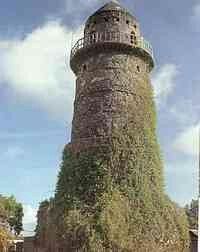
as for the battle of barawa portoguese sources state that, christoa de cunha himself was severly wounded and had to take shelter in mogadishu he and his men left barawa having failed to permenently occupy the town in result loosing the battle the later sought shelter in socotra
- Maritime Discovery: A History of Nautical Exploration from the Earliest Times pg 198

he was later knighted by his king for his efforts according to the portoguese own sources
so i dont know where you got the rape and looting they only managed to burn and loot, and had to evacute to socotra according to portoguese sources
they themselves admitted they withdrew from the town
no amount of historical revisionism will ever change the fact that Portugal for all its glory never occupied the Somali cost here is the map
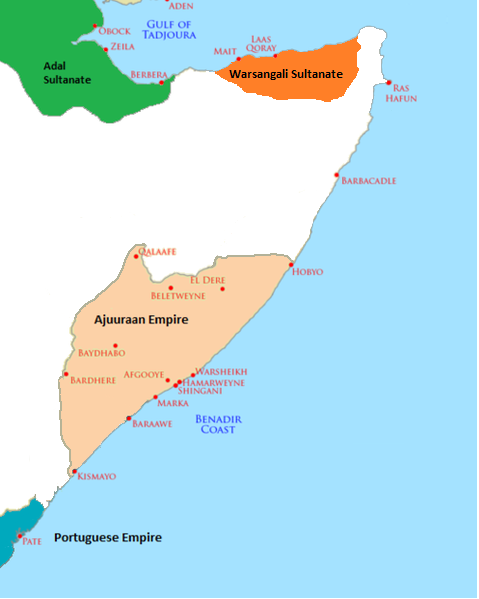

youre known as a historical revisionist troll, who has been debukt by @Factz and me and also others like @Apollo i dont know why youre still on this site to be honest
as for the Portuguese lighthouse that was built by Somalis we even have one in Mogadishu

as for the battle of barawa portoguese sources state that, christoa de cunha himself was severly wounded and had to take shelter in mogadishu he and his men left barawa having failed to permenently occupy the town in result loosing the battle the later sought shelter in socotra
- Maritime Discovery: A History of Nautical Exploration from the Earliest Times pg 198

he was later knighted by his king for his efforts according to the portoguese own sources
so i dont know where you got the rape and looting they only managed to burn and loot, and had to evacute to socotra according to portoguese sources
they themselves admitted they withdrew from the town
no amount of historical revisionism will ever change the fact that Portugal for all its glory never occupied the Somali cost here is the map

Sorry you have to read this sideways. It was not easy to copy. It's Casannelli, The Shaping of Somali Society, 1982, page 91. It's 1650. The Ajuran only controlled the areas around the marked wells. As should be obvious, the Ajuran never controlled the inter river area closest to the Jubba, and early-on lost most of the area between Qalafo and the Lower Shabelle. Baraawe was a republic, never under Ajuran control or protection.
The Tunni had to face the Portuguese alone.
Last edited:
At this point you're an absolute troll. I know you don't believe the bullshit you spew. Pure revisionism. Ajuran was a kingdom, a multi-clan state that controlled the entire interiverine area and the Benadir coast. No historians deny this. You would have to be an idiot to say these things.Yes, I have been equipping myself for Jihad. No, I will not be saying Bantus own all of Somalia, nor will I be using blogs. The Sabaki-speakers cleared the coastal strip, making it safe for livestock herders because it eliminated the tsetse. Then, about 1440 pressure from Oromo coming in from the west and Somali clans from the north pushed the Bantu off these desirable lands, either south of the Tana or up the rivers into tsetse infested forested areas not suitable for use by the nomads.
The coastal Bantus abandoned their lands. It is the Gabawiin, Shabelli, Makaane, Shidle. etc , who stayed, resettling on lands the Samaales could not use, who deserve to stay on those lands, at least the ones they have held and farmed for generations.
The Gosha and Mushunguli are a different story. They were enslaved after 1800, escaped to the forests of the Jubba, defeated the Aweer and Warday, established the Sultanate of the Gosha, defeated the combined forces of the Ogaden west of the Jubba, made treaties with the Tunni and Baraawa, the British and the Zanzibari Sultanate. They were only defeated by the Italians.
Here are the land arrangements as they existed in 1977:
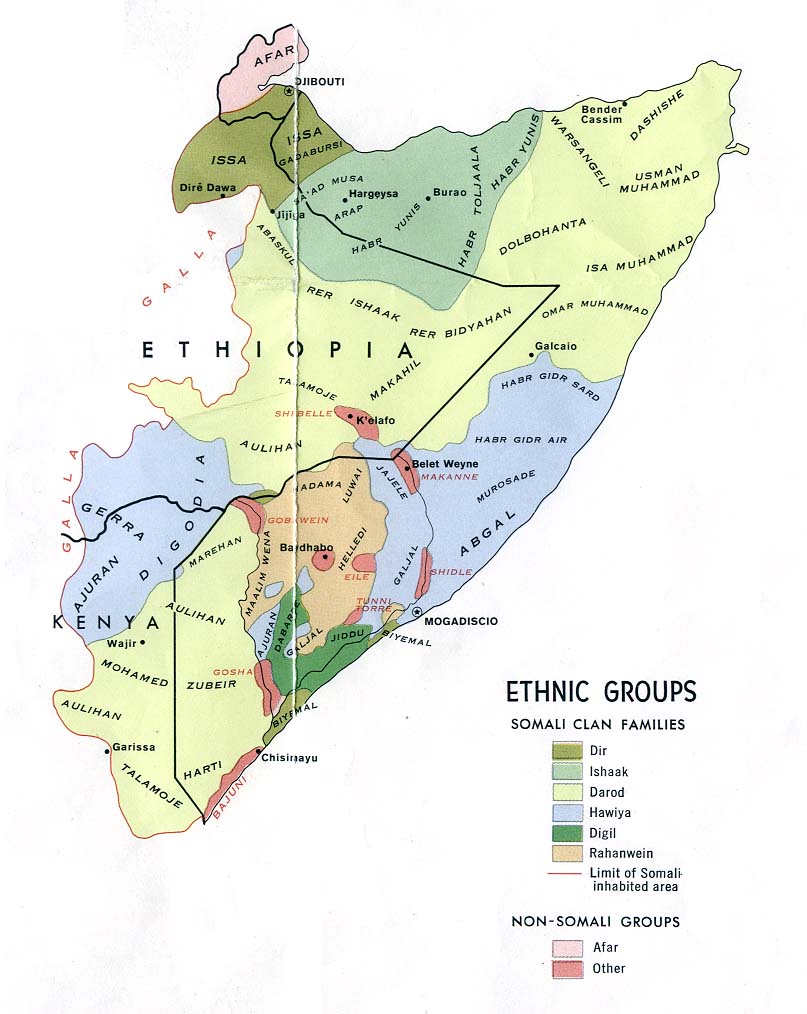
The Ajuran sultanate covered much of southern Somalia, with its domain extending from Hobyo in the north, to Qelafo in the west, to Kismayo in the south. It was a multi-clan state. This source tells you how much territory they compus.

Barawa was under Ajuran Sultanate as you can see.
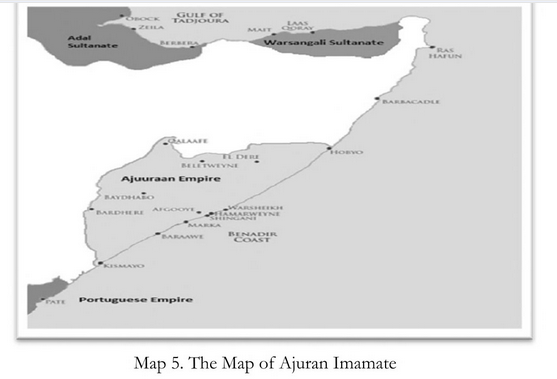
Ajuran actually defended Barawa. Yes, the locals fought and lost but eventually the Ajuran army driven them out.
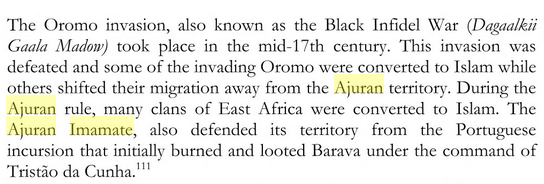
You need to realize Tunni are Rahanweyn. The clans that were under Ajuran Sultanate and contributed the kingdom were Hawiye, Rahanweyn, Madanle and Benadiris.

This source not only tells you they were a highly centralized kingdom but also ruled the benadir coast which you have denied multiple times.

Mogadishu was never an Arab/Persian enclave and the Mudaffar dynasty was an Ajuran family that ruled Mogadishu.

Another great feature from the Ajuran Sultanate is they were great taxers and collected tribute from inner cities, nomads and farmers in the interior as well as products from the coastal cities. The Ajuran ruled their subjects with an iron fist with a powerful military of mounted guns that policed the state and the sophisticated architectures found on the Benadir coast and in the interior during the middle ages were all attributed by the Ajuran engineers.

Lastly, Bantus expansion ended at Tana river (central Kenya). The Bantus never reached Somalia. The Bantus that came into Somalia are slave descendants. Nobody believes your lies or trolls. @Apollo can attest to this.

You have been debunked thoroughly by all these historians at the top. Seems like nobody agrees with you.

Yes, I have been equipping myself for Jihad. No, I will not be saying Bantus own all of Somalia, nor will I be using blogs. The Sabaki-speakers cleared the coastal strip, making it safe for livestock herders because it eliminated the tsetse. Then, about 1440 pressure from Oromo coming in from the west and Somali clans from the north pushed the Bantu off these desirable lands, either south of the Tana or up the rivers into tsetse infested forested areas not suitable for use by the nomads.
The coastal Bantus abandoned their lands. It is the Gabawiin, Shabelli, Makaane, Shidle. etc , who stayed, resettling on lands the Samaales could not use, who deserve to stay on those lands, at least the ones they have held and farmed for generations.
The Gosha and Mushunguli are a different story. They were enslaved after 1800, escaped to the forests of the Jubba, defeated the Aweer and Warday, established the Sultanate of the Gosha, defeated the combined forces of the Ogaden west of the Jubba, made treaties with the Tunni and Baraawa, the British and the Zanzibari Sultanate. They were only defeated by the Italians.
Here are the land arrangements as they existed in 1977:

I don't understand why we have a revisionist troll in this forum such as yourself. Everything you say is bullshit.
1. Oromos never lived in Somalia prior to Somalis.

https://books.google.co.uk/books?id=XpdAzRYruCwC&pg=PA88&dq=oromos+never+lived+in+somalia+prior+to+somalis&hl=en&sa=X&ved=0ahUKEwjrtLHOw_viAhXJN8AKHVZ0AY0Q6AEIKjAA#v=onepage&q=oromos never lived in somalia prior to somalis&f=false
2. Bantus never ever reached Somalia. Everybody knows they are came as slaves and worked in farm labours under Somalis of Geledi Sultanate, Hiraab Imamate and Bimaal Sultanate. Bantus never established a Sultanate and never crossed the Tana river in Kenya.
3. Proto-Somalis have always lived in southern Somalia and were already well established. It was mainly dominated by the Sab clans.
Rahanweyn occupied the most southern part of Somalia. For example, the Tunni clan occupied the lower Shabelle.

The Garre and Tunni occupied the whole Jubba valley. Lower Jubba mainly belonged to Dabarre.

In the antiquity period, the inter-riverine areas were already settled by proto-Rahanweyn.
In the south, you had ancient city-states like Sarapion (Mogadishu), Essina (Merka), Toniki (Barawa), Gondal (Kismayo), Nikon (Adale) and Kismayo (Miandi) who believed to have been proto-Rahanweyn.
Somalis have always dominated the coast and interior of southern Somalia and even ruled it. @Apollo and @geeljire madaxweyne have debunked your absurb claims of Bantus expanding into southern Somalia and foreigners never being the majority in the Benadir coast.
Last thing I want to clarify as @geeljire madaxweyne stated Ajuran Sultanate commenced control of the coastal cities and controlled the lucrative trade across the sea.

On Cassanelli (1982), p. 102. even admits Ajuran Sultanate domain extended from Hobyo in the north, to Qelafo in the west, to Kismayo in the south.
Explaining what territory Ajuran Sultanate covered is pointless and you need to stop talking about where Ajuran settled. We're talking about the kingdom Ajuran ruled. You're like a manipulative liar and it's sad. Just know that I'll be making books about this and will list other historian references. The whole world will learn the beauty of our history.
I don't understand why we have a revisionist troll in this forum such as yourself. Everything you say is bullshit.
1. Oromos never lived in Somalia prior to Somalis.

https://books.google.co.uk/books?id=XpdAzRYruCwC&pg=PA88&dq=oromos+never+lived+in+somalia+prior+to+somalis&hl=en&sa=X&ved=0ahUKEwjrtLHOw_viAhXJN8AKHVZ0AY0Q6AEIKjAA#v=onepage&q=oromos never lived in somalia prior to somalis&f=false
2. Bantus never ever reached Somalia. Everybody knows they are came as slaves and worked in farm labours under Somalis of Geledi Sultanate, Hiraab Imamate and Bimaal Sultanate. Bantus never established a Sultanate and never crossed the Tana river in Kenya.
3. Proto-Somalis have always lived in southern Somalia and were already well established. It was mainly dominated by the Sab clans.
Rahanweyn occupied the most southern part of Somalia. For example, the Tunni clan occupied the lower Shabelle.

The Garre and Tunni occupied the whole Jubba valley. Lower Jubba mainly belonged to Dabarre.

In the antiquity period, the inter-riverine areas were already settled by proto-Rahanweyn.
In the south, you had ancient city-states like Sarapion (Mogadishu), Essina (Merka), Toniki (Barawa), Gondal (Kismayo), Nikon (Adale) and Kismayo (Miandi) who believed to have been proto-Rahanweyn.
Somalis have always dominated the coast and interior of southern Somalia and even ruled it. @Apollo and @geeljire madaxweyne have debunked your absurb claims of Bantus expanding into southern Somalia and foreigners never being the majority in the Benadir coast.
Last thing I want to clarify as @geeljire madaxweyne stated Ajuran Sultanate commenced control of the coastal cities and controlled the lucrative trade across the sea.

On Cassanelli (1982), p. 102. even admits Ajuran Sultanate domain extended from Hobyo in the north, to Qelafo in the west, to Kismayo in the south.
Explaining what territory Ajuran Sultanate covered is pointless and you need to stop talking about where Ajuran settled. We're talking about the kingdom Ajuran ruled. You're like a manipulative liar and it's sad. Just know that I'll be making books about this and will list other historian references. The whole world will learn the beauty of our history.
What you have here is the falsified history. Refusing to read elsewhere, or much of anything thoroughly, is what has left you ignorant. Baadiyow and Wikipedia do not have the answers.
Cassanelli doesn't mention Kismayo on page 102, which is a good thing because it did not exist in Ajuraan times. The Sabaki Bantu capital of Shungwaya was at various locations as the mouth of the Jubba moved, but controlled that area into the early 15th century. Clearly, you didn't actually bother to read Cassanelli:
Cassanelli, Page 102-103:
"We can effectively view the boundaries of this pastoral "state" as coincident with the outer limits of the alliance system. Such an interpretation makes it easier to comprehend how Ajuraan authority could be said to have extended from Mareeg (the territorial center of the Darandoolle, a segment of the Gurqaate Hawiyya) to Qallaafo (the probable homeland of the Jambelle Hawiyya, where their clan ancestor is buried), when in fact it is evident that the polity was not an integral one. In the vast grazing areas between these nodes of Hawiyya control lived sizable numbers of Biimaal, Digil, and Oromo pastoralists who do not appear to have been incorporated fully into the alliance system."
"Like many of the pastoral polities that periodically emerged in the Sahara or central Arabian deserts, the Ajuraan state was not a cohesive territorial entity; rather it consisted of several clan territories joined together by the kin, marriage, and patron/client ties of the inhabitants. Wherever a Hawiyya group had settled and could be incorporated into the alliance system, the "state" could be said to exist. On the local level, lineage segments might opt into the larger confederation for military, labor-sharing, or resource sharing reasons; others might be compelled to pay tribute in order to gain access to watering sites controlled by the Ajuraan."
------------------------------------------------------------------
Did you notice this on the bottom of page 103?
"There is no evidence to date that the Ajuraan state was known to Muslims outside of Somalia."
Last edited:
What you have here is the falsified history. Refusing to read elsewhere, or much of anything thoroughly, is what has left you ignorant. Baadiyow and Wikipedia do not have the answers.
Casanelli doesn't mention Kismayo on page 102, which is a good thing because it did not exist in Ajuraan times. The Sabaki Bantu capital of Shungwaya was at various locations as the mouth of the Jubba moved, but controlled that area into the early 15th century. Clearly, you didn't actually bother to read Cassanelli:
Cassanelli, Page 102-103:
"We can effectively view the boundaries of this pastoral "state" as coincident with ;the outer limits of the alliance system. Such an interpretation makes it easier to comprehend how Ajuraan authority could be said to have extended from Mareeg (the territorial center of the Darandoolle, a segment of the Gurqaate Hawiyya) to Qallaafo (the probable homeland of the Jambelle Hawiyya, where their clan ancestor is buried), when in fact it is evident that the polity was not an integral one. In the vast grazing areas between these nodes of Hawiyya control lived sizable numbers of Biimaal, Digil, and Oromo pastoralists who do not appear to have been incorporated fully into the alliance system."
"Like many of the pastoral polities that periodically emerged in the Sahara or central Arabian deserts, the Ajuraan state was not a cohesive territorial entity; rather it consisted of several clan territories joined together by the kin, marriage, and patron/client ties of the inhabitants. Wherever a Hawiyya group had settled and could be incorporated into the alliance system, the "state" could be said to exist. On the local level, lineage segments might opt into the larger confederation for military, labor-sharing, or resource sharing reasons; others might be compelled to pay tribute in order to gain access to watering sites controlled by the Ajuraan."
------------------------------------------------------------------
Did you notice this on the bottom of page 103?
"There is no evidence to date that the Ajuraan state was known to Muslims outside of Somalia."
First of all. NOTHING I published here were Wikipedia articles but were in fact, from other historians who have PHD in horn history called Ali Jimale Ahmed (who you have used multiple times), Michael Dumper and Bruce E. Stanley.
You don't have PHD in Horn of African history so all the historians I have listed do and just because you disagree with them doesn't mean you're right. It just means you don't know history.
Cassanelli only records false traditions by minorities and you have decided to accept it and embrace it as real history which left you ignorant, not me. The reason you do this is because you have an anti-Somali agenda and everybody on this forum knows it. I can record myths and traditions, doesn't mean it's history. That is the clear distinction between us.
Shungwaya, fyi also another myth.

Lastly, Ajuran Sultanate was known around the world. They had contacts with Ottoman Empire, safavid Empire, Mughal Empire, Portuguese Empire (who they defeated multiple times), Swahili coast, Arabia and even far east. I already showed you a book for it and you made an excuse. I've already done debunking you. You're just a clown with no knowledge.
First of all. NOTHING I published here were Wikipedia articles but were in fact, from other historians who have PHD in horn history called Ali Jimale Ahmed (who you have used multiple times), Michael Dumper and Bruce E. Stanley.
You don't have PHD in Horn of African history so all the historians I have listed do and just because you disagree with them doesn't mean you're right. It just means you don't know history.
Cassanelli only records false traditions by minorities and you have decided to accept it and embrace it as real history which left you ignorant, not me. The reason you do this is because you have an anti-Somali agenda and everybody on this forum knows it. I can record myths and traditions, doesn't mean it's history. That is the clear distinction between us.
Shungwaya, fyi also another myth.
Lastly, Ajuran Sultanate was known around the world. They had contacts with Ottoman Empire, safavid Empire, Mughal Empire, Portuguese Empire (who they defeated multiple times), Swahili coast, Arabia and even far east. I already showed you a book for it and you made an excuse. I've already done debunking you. You're just a clown with no knowledge.
The Ajuraan were not known in Egypt or Turkey or any other Muslim court outside of Somalia. Those Somalis that got to China, etc. were not Ajuraan, and did not represent that court.
There was a period in the 1970s to 1990s when Shungwaya was regarded as a myth. I was personally fooled and my response to it is still online at Somnet. This changed with the recognition of the significance of Chittick's 1969 publication of "An Archaeological Reconnaissance of the Southern Somali Coast" :
.https://www.tandfonline.com/doi/abs/10.1080/00672706909511511
and James de Vere Allen's 1983 presentation of a synopsis of his work Swahili Origins , which he called "Shungwaya, the Segeju and Somali History" at the second International Congress of Somali Studies. The book has the deep history and the footnotes, but the synopsis can be easily read online here:
http://dspace-roma3.caspur.it/bitst..._Shungwaya, the Segeju and Somali History.pdf
______________________________________________________
All you are retaining are the falsified or discarded materials that agree with your agenda. Don't forget that 7th to 10th century Bantu pottery was found at multiple sites on the southern Somali coast and as far north as a village site at Gezira, north of Mog.
Any author that denies these sources today is dealing in hogwash. Baadiyow has a Phd, but is sequentially wrong, wrong, wrong, as demonstrated.
You are the one misrepresenting Cassanelli. Go back and read page 102. Dumper and Stanley are editors of an encyclopedia, not article sources. Ali Jimale Ahmed is usually a credible author, but he is is a poet, essayist, and short story writer, not an historian. He teaches comparative literature at Queens College, New York. He is the editor of The invention of Somalia and the author of "Daybreak is Near, Won't You Become Sour" in that book. FYI, his is a plea to sift through "the myths and half-truths" of the past. Where did you quote him?
The Ajuraan were not known in Egypt or Turkey or any other Muslim court outside of Somalia. Those Somalis that got to China, etc. were not Ajuraan, and did not represent that court.
There was a period in the 1970s to 1990s when Shungwaya was regarded as a myth. I was personally fooled and my response to it is still online at Somnet. This changed with the recognition of the significance of Chittick's 1969 publication of "An Archaeological Reconnaissance of the Southern Somali Coast" :
.https://www.tandfonline.com/doi/abs/10.1080/00672706909511511
and James de Vere Allen's 1983 presentation of a synopsis of his work Swahili Origins , which he called "Shungwaya, the Segeju and Somali History" at the second International Congress of Somali Studies. The book has the deep history and the footnotes, but the synopsis can be easily read online here:
http://dspace-roma3.caspur.it/bitstream/2307/2886/1/05_VERE ALLEN J._Shungwaya, the Segeju and Somali History.pdf
______________________________________________________
All you are retaining are the falsified or discarded materials that agree with your agenda. Don't forget that 7th to 10th century Bantu pottery was found at multiple sites on the southern Somali coast and as far north as a village site at Gezira, north of Mog.
Any author that denies these sources today is dealing in hogwash. Baadiyow has a Phd, but is sequentially wrong, wrong, wrong, as demonstrated.
You are the one misrepresenting Cassanelli. Go back and read page 102. Dumper and Stanley are editors of an encyclopedia, not article sources. Ali Jimale Ahmed is usually a credible author, but he is is a poet, essayist, and short story writer, not an historian. He teaches comparative literature at Queens College, New York. He is the editor of The invention of Somalia and the author of "Daybreak is Near, Won't You Become Sour" in that book. FYI, his is a plea to sift through "the myths and half-truths" of the past. Where did you quote him?
listen grantz this is getting rediculous stop derailing my thread about somali hhistory in to an argument that bantus inhabited the somali coast literally going against all major acedemia and major historical sources
even going against youre own western sources do us a favor and argue with western acdemics and historians which you cant do becosue you dont hold a phd in hsitory
ever heard of the bantu expansion these parasites literally expanded from west africa a thousand yesr ago their "original homeland "
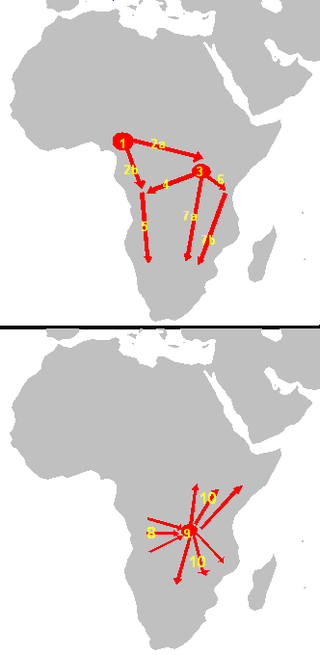
10 = 2,000–1,000 BP: last phase
the general concesus is that bantus expanded from west africa their original home into
Prior to the arrival of Bantus in Southeast Africa, Cushitic-speaking peoples had migrated into the region from the Ethiopian Highlandsand other more northerly areas. The first waves consisted of Southern Cushitic speakers, who settled around Lake Turkana and parts of Tanzania beginning around 5,000 years ago.
the general concesus is that bantus arrived 2 thousand years ago in to east africa before that southern cushitic where their before them
literally everyone disagrees with you in acedemia , so do me a favor and stop derailing my thread you troll

Last edited:
The Ajuraan were not known in Egypt or Turkey or any other Muslim court outside of Somalia. Those Somalis that got to China, etc. were not Ajuraan, and did not represent that court.
There was a period in the 1970s to 1990s when Shungwaya was regarded as a myth. I was personally fooled and my response to it is still online at Somnet. This changed with the recognition of the significance of Chittick's 1969 publication of "An Archaeological Reconnaissance of the Southern Somali Coast" :
.https://www.tandfonline.com/doi/abs/10.1080/00672706909511511
and James de Vere Allen's 1983 presentation of a synopsis of his work Swahili Origins , which he called "Shungwaya, the Segeju and Somali History" at the second International Congress of Somali Studies. The book has the deep history and the footnotes, but the synopsis can be easily read online here:
http://dspace-roma3.caspur.it/bitstream/2307/2886/1/05_VERE ALLEN J._Shungwaya, the Segeju and Somali History.pdf
______________________________________________________
All you are retaining are the falsified or discarded materials that agree with your agenda. Don't forget that 7th to 10th century Bantu pottery was found at multiple sites on the southern Somali coast and as far north as a village site at Gezira, north of Mog.
Any author that denies these sources today is dealing in hogwash. Baadiyow has a Phd, but is sequentially wrong, wrong, wrong, as demonstrated.
You are the one misrepresenting Cassanelli. Go back and read page 102. Dumper and Stanley are editors of an encyclopedia, not article sources. Ali Jimale Ahmed is usually a credible author, but he is is a poet, essayist, and short story writer, not an historian. He teaches comparative literature at Queens College, New York. He is the editor of The invention of Somalia and the author of "Daybreak is Near, Won't You Become Sour" in that book. FYI, his is a plea to sift through "the myths and half-truths" of the past. Where did you quote him?
Look at you denying every author and you have the nerve to call these historians false?

Sorry, you can't deny every historian that disagree with your nonsense. Nothing they stated is wrong nor have any other historian challanged them because it's widely accepted. It's only your dumbass.
Your only evidence is Cassanelli who records myths and false traditions by the minorities. Of course, you will embrace it as history because you have an anti-Somali agenda like I said before.
Fyi, I quoted many references from Ali Jimale Ahmed when he said Oromos never lived in Somalia prior to Somalis. How much territory Ajuran Sultanate ruled and how Sab communities dominated southern Somalia in the antiquity and established southern Somali city-states. These later evolved into Mogadishu, Barawa, Merca and other cities in the Benadir that were later settled by different Somali tribes from the north. He also states Bantus came into southern Somalia as slaves during the 19th and 20th century. Bantus never crossed Tana river, you can quit trying because nobody believes your bull crap.
Shungwaya is a myth. I can't believe you're still talking about them.

Even archaeologists failed to find sites claimed by their mythical traditions.

https://books.google.co.uk/books?id=VCLkDFxkMjwC&printsec=frontcover&dq=Contemporary+Archaeology+in+Theory:+The+New+Pragmatism&hl=en&sa=X&ved=0ahUKEwjKw_-N8PziAhWXh1wKHSinDUcQ6AEIKjAA#v=onepage&q=Contemporary Archaeology in Theory: The New Pragmatism&f=false
Ottoman Empire recognized Ajuran Sutlanate as their close ally. Ajuran Sultanate had trade links across the globe. The Ajuran currency has been found in UAE.

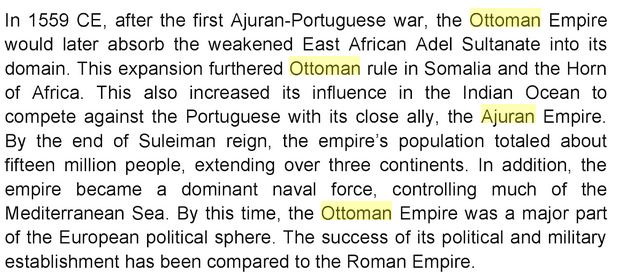
https://books.google.co.uk/books?id=wRY-DQAAQBAJ&pg=PT167&dq=Ajuran+Ottoman&hl=en&sa=X&ved=0ahUKEwj1gZLK7PziAhVJPcAKHahYC9UQ6AEIVzAI#v=onepage&q=Ajuran Ottoman&f=false
Look at you denying every author and you have the nerve to call these historians false?
Sorry, you can't deny every historian that disagree with your nonsense. Nothing they stated is wrong nor have any other historian challanged them because it's widely accepted. It's only your dumbass.
Your only evidence is Cassanelli who records myths and false traditions by the minorities. Of course, you will embrace it as history because you have an anti-Somali agenda like I said before.
Fyi, I quoted many references from Ali Jimale Ahmed when he said Oromos never lived in Somalia prior to Somalis. How much territory Ajuran Sultanate ruled and how Sab communities dominated southern Somalia in the antiquity and established southern Somali city-states. These later evolved into Mogadishu, Barawa, Merca and other cities in the Benadir that were later settled by different Somali tribes from the north. He also states Bantus came into southern Somalia as slaves during the 19th and 20th century. Bantus never crossed Tana river, you can quit trying because nobody believes your bull crap.
Shungwaya is a myth. I can't believe you're still talking about them.
Even archaeologists failed to find sites claimed by their mythical traditions.

https://books.google.co.uk/books?id=VCLkDFxkMjwC&printsec=frontcover&dq=Contemporary+Archaeology+in+Theory:+The+New+Pragmatism&hl=en&sa=X&ved=0ahUKEwjKw_-N8PziAhWXh1wKHSinDUcQ6AEIKjAA#v=onepage&q=Contemporary Archaeology in Theory: The New Pragmatism&f=false
Ottoman Empire recognized Ajuran Sutlanate as their close ally. Ajuran Sultanate had trade links across the globe. The Ajuran currency has been found in UAE.

https://books.google.co.uk/books?id=wRY-DQAAQBAJ&pg=PT167&dq=Ajuran+Ottoman&hl=en&sa=X&ved=0ahUKEwj1gZLK7PziAhVJPcAKHahYC9UQ6AEIVzAI#v=onepage&q=Ajuran Ottoman&f=false
If you quoted Ali Jimale Ahmed, there should be links. Pardon me for doubting you, but those topics are not typical for him.
1559 CE is the end of the Adal wars. The Ottomans didn't know the Ajuraan existed. The Persians were allies of the Portuguese and together kept the Ottomans out of the Indian Ocean after Suleiman, as the Ottomans declined in power and slid into the "sick man of Europe" phase. Mir Ali Bey was a fluke, about whom Ottoman Sultan Murid III was kept carefully misinformed. The 1564-65 expedition to Aceh that Baadiyow attributes to Mir Ali, was Suleiman's. We have been through this.
See James Allen, cited above, which you have clearly not yet read, for the Shungwaya locations. The Bantu capital moved with the mouth of the Jubba river, and multiple sites have been found.
I am saving my big guns for my OP postings, where I will hopefully have some derailment protection. It looks like I am going to need it. Your responses have no links for the serious claims, which are getting increasingly distant from the links you do offer, and which have no pagination or proper documentation..
You seriously need a course in historiography.
If you quoted Ali Jimale Ahmed, there should be links. Pardon me for doubting you, but those topics are not typical for him.
1559 CE is the end of the Adal wars. The Ottomans didn't know the Ajuraan existed. The Persians were allies of the Portuguese and together kept the Ottomans out of the Indian Ocean after Suleiman, as the Ottomans declined in power and slid into the "sick man of Europe" phase. Mir Ali Bey was a fluke, about whom Ottoman Sultan Murid III was kept carefully misinformed. The 1564-65 expedition to Aceh that Baadiyow attributes to Mir Ali, was Suleiman's. We have been through this.
See James Allen, cited above, which you have clearly not yet read, for the Shungwaya locations. The Bantu capital moved with the mouth of the Jubba river, and multiple sites have been found.
I am saving my big guns for my OP postings, where I will hopefully have some derailment protection. It looks like I am going to need it. Your responses have no links for the serious claims, which are getting increasingly distant from the links you do offer, and which have no pagination or proper documentation..
You seriously need a course in historiography.
Blah blah blah. I showed you a source to debunk your lies so f*ck off. You're not a source.
Shungwaya is largely considered a mythical legend by most scholars just like the Atlantis. You're a fucking joke with no knowledge of history. Bantus never reached south Somalia, that is a fact.
Another source of Ajuran Sultanate supporting the Ottomans to liberate the Swahili coast from the Portuguese colonizers.

https://books.google.co.uk/books?id=PebBBAAAQBAJ&pg=PA335&dq=the+portuguese+were+evicted+from+the+swahili+coast+up+to+mozambique+with+the+help+from+somali+ajuran&hl=en&sa=X&ved=0ahUKEwivvPOAhf7iAhWFSEEAHX-iD90Q6AEIKjAA#v=onepage&q=the portuguese were evicted from the swahili coast up to mozambique with the help from somali ajuran&f=false
What you need to realize is Ajuran Sultanate had provinces and their coastal cities like Mogadishu, Merca, Barawa, Gondershe, Warsheikh, Mareeg, Hobyo, Kismayo and etc were trading posts and had navy.
"The Ajuran Sultanate received assistance from its close ally the Ottoman Empire, and with the import of firearms through the port of Mogadishu, the army began acquiring muskets and cannons. The Ottomans would also remain a key ally during the Ajuran-Portuguese wars. Horses used for military purposes were also raised in the interior, and numerous stone fortifications were erected to provide shelter for the army in the coastal districts. In each province, the soldiers were under the supervision of a military commander known as an emir, and the coastal areas and the Indian ocean trade were protected by a navy."
Straight from the Portuguese source: Welch (1950), page. 25.
And the mingFirst of all. NOTHING I published here were Wikipedia articles but were in fact, from other historians who have PHD in horn history called Ali Jimale Ahmed (who you have used multiple times), Michael Dumper and Bruce E. Stanley.
You don't have PHD in Horn of African history so all the historians I have listed do and just because you disagree with them doesn't mean you're right. It just means you don't know history.
Cassanelli only records false traditions by minorities and you have decided to accept it and embrace it as real history which left you ignorant, not me. The reason you do this is because you have an anti-Somali agenda and everybody on this forum knows it. I can record myths and traditions, doesn't mean it's history. That is the clear distinction between us.
Shungwaya, fyi also another myth.
Lastly, Ajuran Sultanate was known around the world. They had contacts with Ottoman Empire, safavid Empire, Mughal Empire, Portuguese Empire (who they defeated multiple times), Swahili coast, Arabia and even far east. I already showed you a book for it and you made an excuse. I've already done debunking you. You're just a clown with no knowledge.
And the ming
You know, you really are one disgusting dude. My apologies for having to read this sideways and small, but even you should be able to see this is page 25 and your ""quote" is not there.
In case you didn't notice, your link is to a fictional novel, which does not have footnotes and appears to have been informed by some of your Wiki articles.
http://pullat.net/surypullat/
"Sury Pullat introspects on the current topics of development, vis-a-vis education, and all those issues that matter to youth to make a living. Divisiveness of spirituality and religions is dwelled into in-depth, coming up with suggestions for harmonious living, focusing on greater common good. Societal transformation through multiple revolutions is portrayed."
"In his debut novel DESTINED ENCOUNTERS, he traces yearning voyage of five characters Baig, Crised, Dastur, Ingrid and Risto who pass through the University of Realisation and their lives thereafter. Their trysts with destiny and each other at turning points in their lives and at particular cities in the world, offer ideas and answers for new generation to maneuver in troubled world held hostage by society, religion and politics."
Don't try this on my OP posts.
You know, you really are one disgusting dude. My apologies for having to read this sideways and small, but even you should be able to see this is page 25 and your ""quote" is not there.
View attachment 74486
In case you didn't notice, your link is to a fictional novel, which does not have footnotes and appears to have been informed by some of your Wiki articles.
http://pullat.net/surypullat/
"Sury Pullat introspects on the current topics of development, vis-a-vis education, and all those issues that matter to youth to make a living. Divisiveness of spirituality and religions is dwelled into in-depth, coming up with suggestions for harmonious living, focusing on greater common good. Societal transformation through multiple revolutions is portrayed."
"In his debut novel DESTINED ENCOUNTERS, he traces yearning voyage of five characters Baig, Crised, Dastur, Ingrid and Risto who pass through the University of Realisation and their lives thereafter. Their trysts with destiny and each other at turning points in their lives and at particular cities in the world, offer ideas and answers for new generation to maneuver in troubled world held hostage by society, religion and politics."
Don't try this on my OP posts.
sorry to but in but that was complete garbage

you said and i quote
"In case you didn't notice, your link is to a fictional novel, which does not have footnotes and appears to have been informed by some of your Wiki articles."
while attempting to direct us to a fictional novel on a blog site

grants youre a crazy old man when are you going to take youre pills oldman and stop derailing my thread yout old fool




And the ming
You are using incomplete and outdated material.
https://www.cambridge.org/core/jour...tu-expansion/CF584070DE5574C6E43ADF50E38B5803
"This paper outlines four stages of the Bantu expansion: first, the initial push through the equatorial forest from the northern to the southern woodlands; second, the occupation of the southern woodland belt from coast to coast; third, the colonization of the Tanzania, Kenya and southern Somali coastline and of the northern sector of the lake region; fourth, the colonization south-wards, north-westwards and north-eastwards from this extended nucleus. The evidence for the first stage is largely linguistic and is likely to remain so. The outlines of the fourth stage can be established very largely from traditional evidence. It is for chronological data concerning the second and third stages that we can now turn hopefully to archaeology. In both these stages the Bantu expansion seems to have coincided fairly closely with the spread of the Iron Age; and, if the spread of the Iron Age through the area north of the southern woodlands can now be traced in something like the detail which we already have for Zambia and Rhodesia, the mystery of the Bantu expansion will have been largely unravelled."
Last edited:
You, Sir, are just another lazy Falsy. Try his link. I copied it so he couldn't change it'. My link is to the author's website.
You, Sir, are just another lazy "Falsy". Try his link. I copied it so he couldn't change it'. My link is to the author's website, which has a description of the novel.
I will stop "derailing" any time you stop with the hogwash. Wait for my OP post, which will have a lot more information.
sorry to but in but that was complete garbage
you said and i quote
"In case you didn't notice, your link is to a fictional novel, which does not have footnotes and appears to have been informed by some of your Wiki articles."
while attempting to direct us to a fictional novel on a blog site
this is literally a fictional novel on a blog site
grants youre a crazy old man when are you going to take youre pills oldman and stop derailing my thread yout old fool
You, Sir, are just another lazy "Falsy". Try his link. I copied it so he couldn't change it'. My link is to the author's website, which has a description of the novel.
I will stop "derailing" any time you stop with the hogwash. Wait for my OP post, which will have a lot more information.
http://pullat.net/surypullat/You know, you really are one disgusting dude. My apologies for having to read this sideways and small, but even you should be able to see this is page 25 and your ""quote" is not there.
View attachment 74486
In case you didn't notice, your link is to a fictional novel, which does not have footnotes and appears to have been informed by some of your Wiki articles.
http://pullat.net/surypullat/
"Sury Pullat introspects on the current topics of development, vis-a-vis education, and all those issues that matter to youth to make a living. Divisiveness of spirituality and religions is dwelled into in-depth, coming up with suggestions for harmonious living, focusing on greater common good. Societal transformation through multiple revolutions is portrayed."
"In his debut novel DESTINED ENCOUNTERS, he traces yearning voyage of five characters Baig, Crised, Dastur, Ingrid and Risto who pass through the University of Realisation and their lives thereafter. Their trysts with destiny and each other at turning points in their lives and at particular cities in the world, offer ideas and answers for new generation to maneuver in troubled world held hostage by society, religion and politics."
Don't try this on my OP posts.
"Sury Pullat introspects on the current topics of development, vis-a-vis education, and all those issues that matter to youth to make a living. Divisiveness of spirituality and religions is dwelled into in-depth, coming up with suggestions for harmonious living, focusing on greater common good. Societal transformation through multiple revolutions is portrayed."
"In his debut novel"DESTINED ENCOUNTERS, he traces yearning voyage of five characters Baig, Crised, Dastur, Ingrid and Risto who pass through the University of Realisation and their lives thereafter. Their trysts with destiny and each other at turning points in their lives and at particular cities in the world, offer ideas and answers for new generation to maneuver in troubled world held hostage by society, religion and politics."
"In his debut novel "

this is getting too rediculous grantz even in youre own words you admitted it was a novel
You are using incomplete and outdated material.
https://www.cambridge.org/core/jour...tu-expansion/CF584070DE5574C6E43ADF50E38B5803
"This paper outlines four stages of the Bantu expansion: first, the initial push through the equatorial forest from the northern to the southern woodlands; second, the occupation of the southern woodland belt from coast to coast; third, the colonization of the Tanzania, Kenya and southern Somali coastline and of the northern sector of the lake region; fourth, the colonization south-wards, north-westwards and north-eastwards from this extended nucleus. The evidence for the first stage is largely linguistic and is likely to remain so. The outlines of the fourth stage can be established very largely from traditional evidence. It is for chronological data concerning the second and third stages that we can now turn hopefully to archaeology. In both these stages the Bantu expansion seems to have coincided fairly closely with the spread of the Iron Age; and, if the spread of the Iron Age through the area north of the southern woodlands can now be traced in something like the detail which we already have for Zambia and Rhodesia, the mystery of the Bantu expansion will have been largely unravelled."
third, the colonization of the Tanzania, Kenya and southern Somali coastline
lool you just confirmed you believe in the bantu expansion which has already been confirmed by scientists and leading historians , you just admitted to youre anti somali agenda by admitting that these bantu colonizers colonized east africa and were not natives to the horn or east africa, ,
you also technically admitted you are a lying historical revisionist
 @Grant are you ok it seems were loosing you old man
@Grant are you ok it seems were loosing you old mango get some help, you literally exposed youreself as a lying manipulative cheat with an anti somali agenda you lying old fool and hop of my thread
Last edited:
- Status
- Not open for further replies.

 waiting for it to say somalia belongs to bantus with a source linking back to one of his blogs.
waiting for it to say somalia belongs to bantus with a source linking back to one of his blogs.